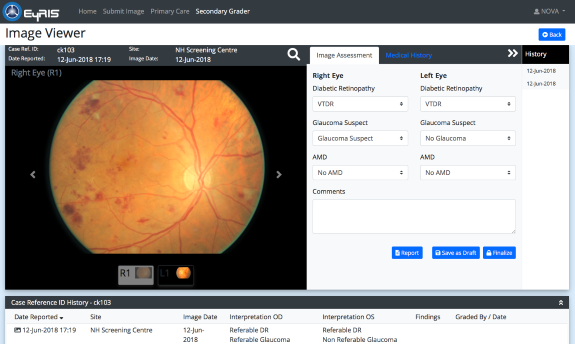 17 Aug 2018 – Nova begins it journey to revolutionize healthcare delivery through deep technology by investing in a new spin-off EyRIS. The company will focus on developing and commercializing Deep Learning Systems (DLS) for healthcare industry.
17 Aug 2018 – Nova begins it journey to revolutionize healthcare delivery through deep technology by investing in a new spin-off EyRIS. The company will focus on developing and commercializing Deep Learning Systems (DLS) for healthcare industry.
DLS, a breakthrough machine learning technology, utilizes representation-learning methods with multiple levels of representation to process natural data in their raw form, recognizing the intricate structures in high-dimensional data.
SELENA+ is our first artificial intelligence algorithm that performs automated retinal photo analysis to detect retinopathy and systemic complications in diabetic patients. The AI system is bundled with a cloud-based fundus image management and reporting system.
About SELENA+

Early screening is highly effective in helping to prevent blindness from a range of eye diseases. SELENA+ is an intelligent deep learning system that can detect eye diseases: this system was jointly invented by researchers at NUS School of Computing (NUS-SoC) and the Singapore Eye Research Institute (SERI) to perform automated image analysis of retinal images. The analysis results will be used to provide early detection of eye diseases, including diabetic retinopathy (DR), glaucoma and age-related macular degeneration (AMD).
About Singapore Eye Research Institute (SERI)

The Singapore Eye Research Institute (SERI) was conceived with the foresight of a visionary leader, Prof Arthur Lim, the founder and first Medical Director of the Singapore National Eye Centre (SNEC), who had keenly pursued the idea of an eye research institute in a period of time when research was hardly in vogue in Singapore.
Established in 1997, SERI is Singapore’s national research institute for ophthalmic and vision research. SERI’s mission is to conduct high impact eye research with the aim to prevent blindness, low vision and major eye diseases common to Singaporeans and Asians. Over the last decade or so, SERI has conducted landmark research that has led to tangible outcomes, actual patient benefit, and success stories. It has paved the way for significant improvements in how eye diseases are treated and prevented, not just for Singaporeans or Asians but on a global scale.
National University of Singapore – School of Computing

Counted among the world’s top universities in technology learning and research, NUS School of Computing enjoys a growing network of ties with partners in Singapore, the region and other parts of the world.
Internationally, NUS School of Computing and its Department of Computer Science and Department of Information Systems and Analytics have established mutually beneficial relations with corresponding faculties and departments in leading universities in Asia and further abroad.
The School has long upheld the borderless approach to research collaboration, with ties being forged and maintained by research groups and individual faculty members with their counterparts in locales ranging from Cambridge and Oxford to Brown, Harvard MIT and UC Berkeley.
Beyond academia, NUS School of Computing works with both industry and government agencies in spearheading niche research efforts and nurturing talent for the dynamic digital economy. The research efforts of faculty members in the School have attracted funding from a range of sources, from Asian Office of Aerospace Research & Development (AOARD) to Hewlett Packard, Microsoft and Nokia and Singapore Press Holdings, among others. Working with industry input, the School has embarked on initiatives such as the Services Science, Management and Engineering (SSME), a specialisation that is being offered to undergraduates with input from IBM.
Comments are closed.

